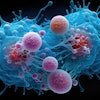Deep learning used with CT to measure chest fat appears to help clinicians predict a patient's risk of heart failure, according to research published October 5 in Radiology: Cardiothoracic Imaging.
The findings offer an effective way to assess a person's heart failure risk, wrote a team led by Quincy Hathaway, MD, of West Virginia University in Morgantown.
"[Our] study demonstrates that fast and reliable deep learning-derived pectoralis muscle and adipose measurements are obtainable from conventional chest CT, which may be predictive of incident heart failure," the group noted.
Rates of heart failure in the U.S. are rising, with some experts estimating annual incidence of one million patients. In light of this, researchers have focused on identifying risk factors for the condition.
"Study of risk factors for the prediction of heart failure has become a rapidly emerging focus of clinical interest to mitigate these rising trends," the investigators noted. "However, compared with prediction models of other cardiovascular diseases (e.g., Framingham Risk score for coronary heart disease), heart failure incidence prediction models are relatively new and perhaps less robust than models predicting heart failure-related hospitalization or mortality."
The study used data from the Multi-Ethnic Study of Atherosclerosis (MESA), a prospective medical research study involving more than 6,000 men and women from six communities in the U.S. Hathaway's group included information from MESA 1,781 participants without baseline heart failure.
Hathaway and colleagues developed a deep-learning algorithm that extracted pectoralis muscle and intermuscular adipose tissue, perimuscular adipose tissue, extramyocellular lipids, and subcutaneous adipose tissue area measurements and evaluated the association between those measurements and incident heart failure. Manual segmentations of 600 chest CT exams taken between 2010 and 2012 were used to train and validate the algorithm. The authors adjusted the results for demographic, clinical/laboratory, and CT (specifically, coronary artery calcium score), and cardiac MRI variables.
Of the 1,781 patients, 41 experienced incident heart failure over a median follow-up of 6.5 years. The team found the following:
- High levels of intermuscular adipose tissue predicted incident heart failure in both unadjusted and adjusted models (hazard ratio, 1.14 and 1.16 respectively, with 1 as reference).
- High levels of perimuscular adipose tissue also predicted incident heart failure in both unadjusted and adjusted models (hazard ratio, 1.19 and 1.25, respectively).
"The deep-learning algorithm developed for our study can potentially be implemented on any conventional chest CT examination," the researchers concluded. "This is advantageous in clinical practice as chest CT examinations are often acquired in individuals at-risk for common cardiothoracic disorders."
The complete study can be found here.




















